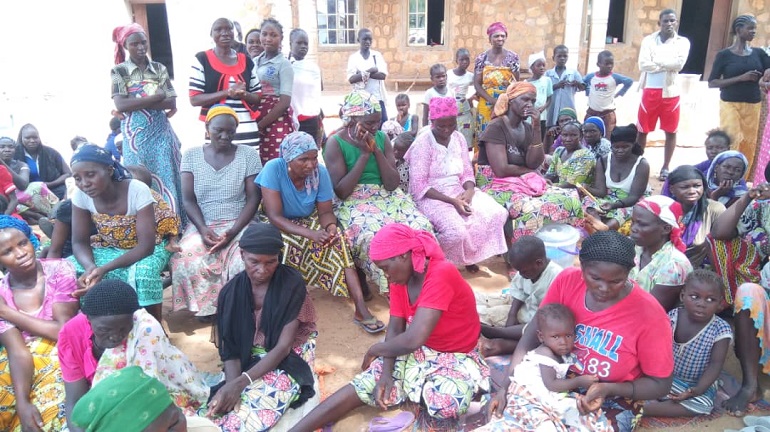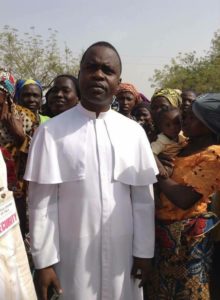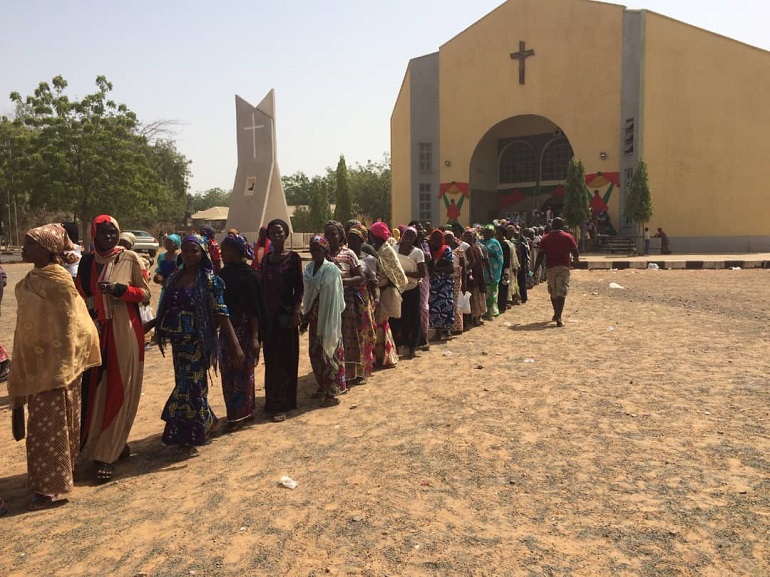
In northeast Nigeria, thousands of people who have fled Boko Haram’s attacks have been told to return back home, despite security concerns.
Boko Haram’s nine-year insurgency has led to an acute crisis, described by the United Nations as one of the most severe in the world today, with more than 20,000 people killed, more than 4,000 women and girls abducted, and more than 2 million internally displaced people (IDPs). The most acute humanitarian needs are concentrated in Borno state – and areas bordering Borno in Adamawa and Yobe states – where the crisis shows no sign of abating, said the UN, due to ongoing hostilities and military strategies which have devastated livelihoods and rendered civilians extremely vulnerable.
And now, thousands of IDPs face pressure to return to their villages from government officials, who claim that their home areas are safe and they can go back to their livelihoods, as Reuters reports. In June, some 2,000 IDPs living in Bakasi camp in Maiduguri, capital of Borno state, were told to go home.
The government’s decision has raised concern and criticism among aid workers and Western diplomats, who say the decision is motivated by the Nigerian elections, with the aim of having as many as possible return to vote in the parties’ primary rounds. These started in August, ahead of the presidential elections in February 2019.

Father Maurice Kwairanga, in charge of St. Theresa Church’s IDP Camp in Yola, capital of Adamawa state, also denounced it as political propaganda. He told World Watch Monitor:
“The authorities want to show they are winning the war, though at local levels where people mostly live in remote areas, the situation is not safe enough. In some parts of Michika, Madagali, and Gwoza, there are still pockets of militants moving in small numbers – 15 to 20 insurgents carrying guns – but large enough to ransack a village of 500 inhabitants. Some IDPs in St. Theresa come from the south of Borno state, notably from Gwoza, which was the ‘capital’ of Boko Haram”.
President Muhammadu Buhari, who is seeking a second term in the February elections, came to power in 2015 with the promise to silence Boko Haram. But, so far, he has failed to curb the Islamist insurgency, despite claims that the radical Islamic group has been technically defeated.
On Thursday (30 August), dozens of Nigerian soldiers were killed as the militants stormed their base in Zari Village, northern Borno state, near the border with Niger. It’s the fourth deadly attack on military posts in northeast Nigeria since July. Nigeria’s Premium Times says at least 90 soldiers have been killed in the past six weeks.
Fr. Kwairanga recalled how he opposed attempts in June to relocate IDPs from St. Theresa camp. He said on two occasions the governor of Borno state – with the army – brought trucks to relocate them, but they refused: “So we told them to leave these people alone; there’s no need to force them if they don’t want to go back.”
The putative returnees pointed out that some IDPs initially returned to their communities along the Cameroon border, only to be killed. Some managed to escape back to St. Theresa camp. Some have been displaced two or three times, while thousands are still trapped in communities around Yola.
Others IDPs, forcibly sent home, now live in camps around Gwoza town. They said militants hide in the bushes and in the mountains. They come overnight to attack and kill – and abduct young women – and there is no army or police presence in such locations.

Looming famine
The government has shut some camps. IDPs who refused to go back to their villages no longer receive aid: some now face serious food shortages.
“Unfortunately, we don’t have enough resources to meet the demands,” said Fr Kwairanga. “The Catholic Church provides food and relief for over 700 IDPs at St. Theresa, but we also take responsibility for food distribution elsewhere when resources enable us to do so.”
He said current insecurity is also fuelled by attacks carried out by Fulani herdsmen: “Most of these communities are farming ones. But for security reasons, they are no longer able to farm.”
He said the herdsmen come in great numbers, some from neighbouring countries, armed with dangerous weapons, to invade the communities, destroy the crops and kill.
“During the last rainy season [June-October 2017], some returnees managed to farm. But in November, when crops were about to be harvested, herdsmen came with their cattle and destroyed everything. Any attempt by villagers to stop the herdsmen is suicidal as they are heavily armed,” he said.
Attempts to report attacks to the police are futile due to bureaucracy, he said, with it taking two days for security forces to intervene. By then, herdsmen have destroyed everything and gone far away, he said.
Sometimes, security forces are reluctant to intervene as they don’t have weapons as powerful as those carried by the Fulanis.
Yesterday, at a conference of more than 70 states, international organisations and NGOs in Berlin, donors pledged $2.17 billion to the Lake Chad Basin regions affected by Boko Haram’s insurgency, Reuters reported.
According to UN humanitarian chief Mark Lowcock, a famine was averted in the region last year, largely thanks to international aid. But millions of people in Nigeria, Niger, Chad and Cameroon are still in dire need, he warned: “The crisis is not over. There are still 10 million people who need lifesaving assistance. A quarter of the people we are trying to reach are displaced from their homes and the only means of staying alive they have is what is provided by humanitarian organisations.”